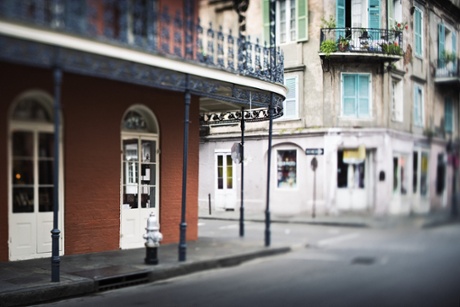
The Tennesee Williams New Orleans literary festival is over for another year, but we’re still in a New Orleans state of mind – and we will be indefinitely, with such a great list to keep us reading. As the famous writer and playwright himself said: “America only has three cities: New York, San Francisco and New Orleans. Everywhere else is just Cleveland.” While we’re not sure what other important cities might want to say about this, in terms of literature the Big Easy is certainly up there. After Susan Larson took us through her essential books about the city – from Streetcar to A Confederacy of Dunces – we turned to our readers to complete the list. Here are some of their recommendations. If your favourite is missing, do add it in the comments.
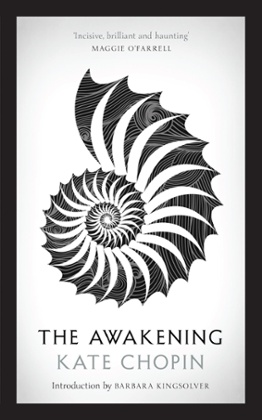
1. The Awakening by Kate Chopin (1899)
“Madame Bovary cajun style,” said Guillaume d’Hautacam on Twitter. This turn-of-the-century novel about a woman’s emotional and sexual awakening caused anger and was out of print for decades, after coming out in a world that wasn’t ready for a book that portrayed “women as real people rather than foils for a masculine disposition”, wrote Barbara Kingsolver in the Guardian. This feminist book about female passion didn’t resurface significantly until women in the 1960s began to read and discuss it. A fascinating story in itself. It was also recommended by Drowned Librarian.
In quotes from the book:
The city atmosphere certainly has improved her. Some way she doesn’t seem like the same woman.
The voice of the sea is seductive, never ceasing, whispering, clamoring, murmuring, inviting the soul to wander in abysses of solitude.
I would give up the unessential; I would give up my money, I would give up my life for my children; but I wouldn’t give myself. I can’t make it more clear; it’s only something I am beginning to comprehend, which is revealing itself to me.
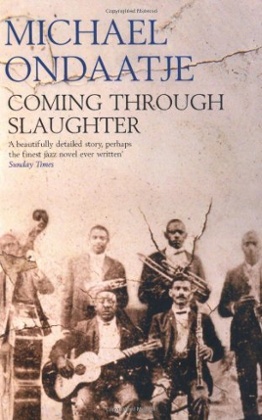
2. Coming Through Slaughter by Michael Ondaatje (1976)
This book by novelist and poet Michael Ondaatje, who won the Booker prize for The English Patient, is an all-time favourite of CzechGrecian’s, “brilliantly capturing New Orleans jazz in both the story and the structure and rhythm of the prose. Absolutely brilliant.” The book recounts the life of jazz musician Buddy Bolden, regarded as one of the inventors of jazz, in the early 20th century and, with some of the rhythms of the music it depicts, Ondaatje mixes fiction and non-fiction, history and interviews, dramatic reconstruction and photography.
KaleHawley also praised it:
A brilliantly imagined early novel about Buddy Bolden and the early days of jazz in New Orleans.
In quotes from the book:
It was a music that had so little wisdom you wanted to clean nearly every note he passed, passed it seemed along the way as if travelling in a car, passed before he even approached it and saw it properly. There was no control except the mood of his power … and it is for this reason it is good you never heard him play on recordings.
The right ending is an open door you can’t see too far out of. It can mean exactly the opposite of what you are thinking.
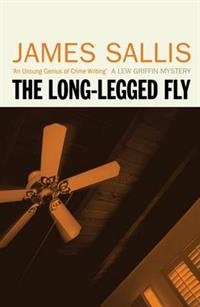
3. Lew Griffin series by James Sallis
Best known for his 2005 novel Drive, adapted into a film of the same name, James Sallis wrote a seven-book crime series centred around Lew Griffin, a bourbon-drinking detective who roams the bleak streets of the city trying to find missing people and, as the cliche goes, himself. “Subtle and oblique in content, [his stories] are meditations upon America rather than tales of policemen and thieves; this marks them out from much of the crime genre,” said Gart Cartwright of the series in the Guardian. slovenia46 said:
James Sallis’s brilliant six-book Lew Griffin series is set in New Orleans (mostly) but it’s less the city and more the soul of a man. Best to read that series in order.
ID0686782 added: “The Lew Griffin books were excellent – and very different from Drive, which most people probably know him for.”
In quotes from the books:
In the darkness things always go away from you. Memory holds you down while regret and sorrow kick hell out of you. The only help you’ll get is a few hard drinks and morning.
from The Long-Legged Fly
I was coming up on a cross street when a man wearing a filthy suit stepped out from around the corner of the building ahead and directly into my path. [...] A chill passed through me. Somehow, indefinably, I felt, felt with the kind of baffled, tacit understanding that we have in dreams , that I had just glimpsed one possible future self. ”
from Black Hornet
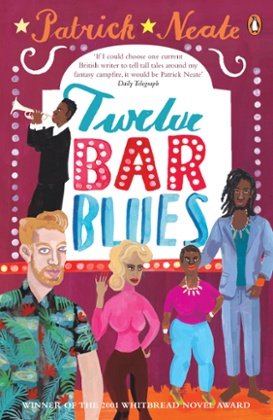
4. Twelve Bar Blues by Patrick Neate (2001)
PleasepleaseTrina recommended this novel: “Twelve Bar Blues covers the city past and present and the story itself is excellent.” And that story intertwines the lives of a young cornet player in early 20th-century New Orleans and of a retired prostitute in modern-day London. The novel won that year’s Whitbread award – now the Costa award – for best novel.
In quotes from the book:
His eyes were a curious mixture of innocent and knowing, like a naive character who’s just happened to see too much.
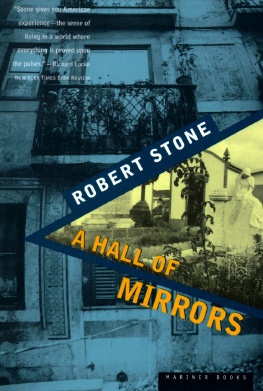
5. A Hall of Mirrors by Robert Stone (1964)
Robert Stone’s “brilliant debut”, recommended by miasmadude, used the city as the setting for an eclectic melange of the dark side of America that emerged in the 60s, “something I shattered my youth against”. It won both the William Faulkner and Houghton Mifflin first novel awards. Stone had been literally registering New Orleans’s inhabitants as a census worker in 1960. With the spirit of the Vietnam war clearly in the background, its characters include a right-wing disc jockey and failed musician, civil rights activists, corrupt politicians and many more fishes out of water.
In quotes from the book:
The American Way is innocence. […] In all situations we must and shall display an innocence so vast and awesome that the entire world will be reduced by it. American innocence shall rise in mighty clouds of vapor to the scent of heaven and confound the nations!
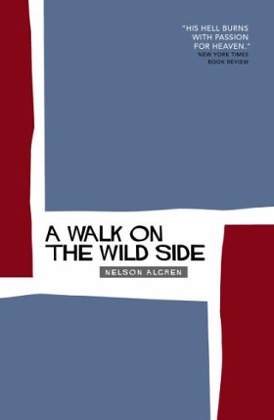
6. A Walk On The Wild Side by Nelson Algren (1956)
Nelson Algren’s novel tells the story of a country boy from Texas who moves to the Big Easy in search of a better life … Depicting the world of prostitutes, pimps and conmen, the book mocks the American Dream and, again, unfolds against the backdrop of the Vietnam period. Algren himself said: “The book asks why lost people sometimes develop into greater human beings than those who have never been lost in their whole lives. Why men who have suffered at the hands of other men are the natural believers in humanity, while those whose part has been simply to acquire, to take all and give nothing, are the most contemptuous of mankind.” It was also the initial inspiration for Lou Reed’s song. Recommended by Lazz.
In quotes from the book:
Never play cards with a man called Doc. Never eat at a place called Mom’s. Never sleep with a woman whose troubles are worse than your own.
Without hesitation, Dove chose the nowhere road. For that was the only place, in his heart of hearts, that he really wanted to go.
“I don’t know what kind of great I’m bound to be,” Dove considered his prospects calmly, “all I know for certain is I’m born a world-shaker.”
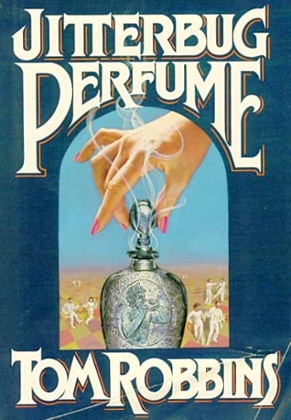
7. Jitterbug Perfume by Tom Robbins (1984)
This novel features four main storylines, set in eighth-century Bohemia and modern-day Paris, Seattle and, of course, New Orleans. One of writer Patrick Ness’s top “unsuitable” books for teenagers – that he nevertheless enjoyed in his teen years: “I was amazed to discover that fiction could be, of all things, playful. That it didn’t always need to be polite. That it could have runaway metaphors just for a laugh”. Recommended by Sophia Jackson.
In quotes from the book:
If New Orleans is not fully in the mainstream of culture, neither is it fully in the mainstream of time. Lacking a well-defined present, it lives somewhere between its past and its future, as if uncertain whether to advance or to retreat. Perhaps it is its perpetual ambivalence that is its secret charm.
Never underestimate how much assistance, how much satisfaction, how much comfort, how much soul and transcendence there might be in a well-made taco and a cold bottle of beer.
It is better to be small, colorful, sexy, careless, and peaceful, like the flowers, than large, conservative, repressed, fearful, and aggressive, like the thunder lizards; a lesson, by the way, that the Earth has yet to learn.
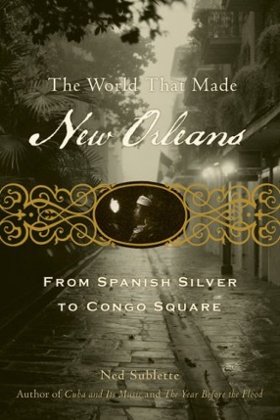
8. The World That Made New Orleans: From Spanish Silver to Congo Square by Ned Sublette (2008)
Composer and musician Ned Sublette thoroughly explores New Orleans’s musical and cultural history and influences, focusing on the city’s first century of existence. It explores Cuba and St Domingue as crucial influences, and serves up lots of fascinating facts about matters including the beginnings of tango, the infamous gumbo dish, and the origin of words like vaudeville and voodoo. delphio said:
Sublette’s book is required reading if you want to know the history of the city. But be prepared for difficult truths.
It was also recommended by Foxiix and leedsmusiclib.
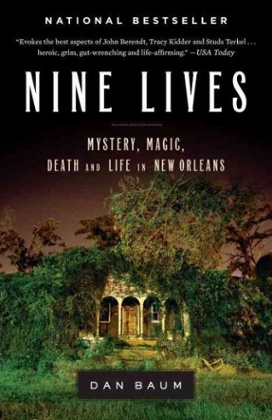
9. Nine Lives: Death and Life in New Orleans by Dan Baum (2009)
“An amazing book sharing stories of nine very different real life people from Nola,” according to Vilove4, Nine Lives was written by ex-New Yorker staff writer Dan Baum. He was one of the many journalists who covered the excruciating aftermath to Hurricane Katrina – but he actually stayed in the city when most of the reporters were gone. This book is more about the personal experiences of nine of the people he encountered than about the political (in)action that followed the devastating hurricane, which he amply covered for the magazine. And it is an attempt to reimagine the swamp town and its unique character as it had been before Katrina.
rb2inGlasgow called it:
A brilliant piece of post-Katrina reportage that traces the city’s recent history through nine interwoven narratives ranging from a Mardi Gras Indian to a city cop, transsexual barkeep, and Carnival king.
In quotes from the book:
That was the point of Mardi Gras, was it not? To serve and honor all the people, to bring into hard lives a touch of royalty and grandeur … To put on a spectacle such as this, free of charge, was an honor. New Orleans was sick and wounded, but no other city in the world had a celebration quite like this. It was beautiful precisely because it was so frivolous.
In New Orleans, no matter how much money you had in the bank, you looked on poverty every day.
New Orleanians are notoriously late showing up, if they show up at all, because by and large they don’t keep calendars. Calendars are tools for managing the future, and in New Orleans the future doesn’t exist.
Life in New Orleans is all about making the present – this moment, right now – as pleasant as possible. So New Orleanians, by and large, aren’t tortured by the frenzy to achieve, acquire, and manage the unmanageable future.
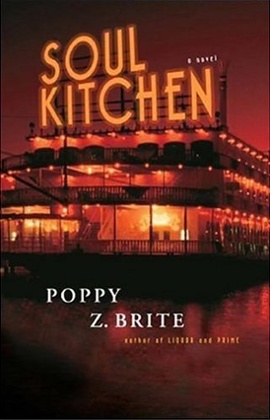
10. Poppy Z Brite’s books
Poppy Z Brite “gets New Orleans,” said neighbourhooduk. Adam Thomasson agreed: “Poppy Z Brite has written many great New Orleans books. He was known early on for his horror and fantasy books but he triumphs with his series of books, starting with Liquor, about a pair of chefs starting their own restaurant.” He’s talking about the Liquor Series, of which the New York Times said: “Brite’s gritty affection for the life of his kitchen hands – the feeders of New Orleans’s lavish belly – shines through. In the acknowledgments, Brite says he completed Soul Kitchen the night before Hurricane Katrina hit. The book is most eloquent as a postcard of New Orleans before the flood – of everyday life as it was before it didn’t exist anymore.”
In quotes from the books:
Didn’t he have to admit, begrudgingly, that in some extra-perverse corner of his brain the idea of having to be out of town before sundown appealed to him? New Orleans had been the only constant thing in his life. But didn’t he get an itchy foot sometimes, didn’t he sometimes think about just throwing all his stuff in his car and going?
Of course he did. Everybody did, even normal people, the ones with triple mortgages and orthodontists’ bills and responsibilities to everything except what they really wanted.
from Drawing Blood
Did we miss your favourite? Do add it in the comments.







